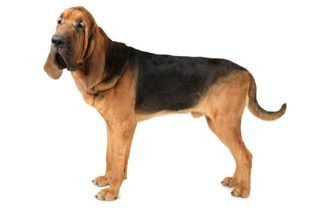
The Bloodhound is a loyal and reliable breed that is believed to have originated from Belgium and France and was used to hunt game. This working breed is known for their extraordinary sense of smell, hence the name. Bloodhounds’ physical characteristics include long, drooping ears, a deep muzzle, and a long, three-layered coat of reddish-brown hair. They also have a long tail that is curved at the end. Common color variations can include black and tan, reddish-brown with black shading, and liver and tan. The breed is likely a combination of the St. Hubert Hound, the Talbot Hound, and later the Foxhound. It has a unique howl – a deep and melodic baying – that is impressive and calming. Bloodhounds are an affectionate, gentle, and eager-to-please breed that is known for their independent, willful nature and tenaciousness. They require solid leadership and patient training in order to thrive, making them a wonderful breed for an experienced dog owner.
The Bloodhound is known for being friendly, gentle, and loyal, making them a great companion. They are intelligent and playful, having an inquisitive nature and an incredible sense of smell, but they are also very patient and tolerant. Bloodhounds get along well with children and other pets, so long as they are properly socialized and trained from a young age. This breed needs plenty of regular exercises, as they are a working breed and have a fairly high energy level. They do best when living indoors, but they do like to spend time outside, so regular walks and playtime are beneficial for them. Due to their high level of intelligence, they are eager to learn and form strong bonds with their owners.
The Bloodhound is a large, gentle, and obedient breed of dog that requires an appropriate balanced diet to stay in optimal health. Bloodhounds have a naturally large appetites, so owners should use portion control and feed their animal balanced and appropriate forms of nutrition for their animal’s size, age, and activity level. A Bloodhound’s diet should usually include a combination of protein, carbohydrates, and healthy fats. It’s important for owners to regularly check with their veterinarian and research their dog’s nutritional needs. Way Canina is an excellent resource to check out for all the nutritional needs of your Bloodhound. Utilizing this resource, owners can learn what foods are okay for their dog to eat and which should be avoided. Responsible pet ownership includes providing them with a healthy diet, various exercise activities, and adequate mental stimulation. Furthermore, if looking to adopt or buy a Bloodhound, research breeders for reputable background information. Doing so can ensure that animals are provided with a safe home and proper care. A healthy diet and plenty of exercise will make sure that your Bloodhound remains healthy and happy!
Common health issues associated with Bloodhounds are bloat, ear and skin infections, allergies, entropion, and epilepsy. It is important to take your Bloodhound to the vet regularly for check-ups, vaccinations, and preventive care. Grooming is also important for this breed and includes regular brushing, bathing, and ear cleaning. A balanced diet with portion control and regular exercise is important to prevent obesity.
It is important to note that Bloodhounds typically have a lifespan ranging between 10 to 12 years, though with proper care, genetics, diet, exercise, and healthcare, they can sometimes live longer.
Are you thinking of owning a Bloodhound? Owning a dog comes with a lot of responsibility, so you should carefully consider if a Bloodhound is the right breed for you. Have a look at all the useful information on Way Canina about different breeds of dogs, their lifestyle and wellbeing, to help you make the best decision. We have many blog posts and articles that provide useful tips and tricks to help you become the best canine guardian you can be.